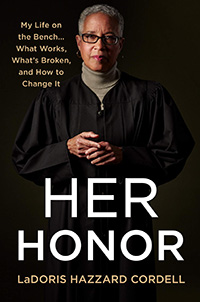 LaDoris Hazzard Cordell, Her Honor: My Life on the Bench... What Works, What's Broken, and How to Change It (New York: Celadon, 2021), 309pp.
LaDoris Hazzard Cordell, Her Honor: My Life on the Bench... What Works, What's Broken, and How to Change It (New York: Celadon, 2021), 309pp.
When LaDoris Cordell started law school at Stanford University in 1971, she was one of only a handful of black students. And the law faculty? Not a single female, African American, or person of any color other than white. When California's governor Jerry Brown appointed Cordell to the municipal court in 1982, she became the first African American female judge in all of Northern California.
So, Cordell is the quintessential trailblazer, and after almost twenty years as a judge (she retired in 2001), she brings a unique perspective to our legal system in general and to the judiciary in particular. Unlike some judges who stay in one place for their careers, Cordell worked in a broad diversity of courts: juvenile, family, probate, criminal, traffic, small claims, and even name changes. She has called her book a "primoir," that is, partly a primer on the law, and partly a personal memoir.
On the personal level, I loved Cordell's self-effacing sense of humor, especially given the otherwise serious subject matter. She acknowledges that she made a few mistakes, and wishes for a do-over. She describes laughing and crying with people who were in her courtroom. She admits that no judge knows everything, and that a couple times she knew little about the law pertaining to certain cases (like mental illness). The work could be "emotionally draining" (30–40 cases a day). At other times it was dreadfully boring or surreal (wealthy estates left to pets). On the personal level, Cordell humanizes our judges.
As for our legal system and the judiciary, she does an excellent job on two fronts. After reading her book, you understand that the law is inherently complicated. There are complex issues of public policy, philosophic questions, and historical precedents about which reasonable people disagree (cf. mandatory sentencing, jury selection, plea deals, rehab v. punishment, etc.). Our legal system is also imperfect: "When I ascended to the bench, my notion of the law's blackness and whiteness quickly faded to grayish. Determining what was legal or illegal wasn't the end but the beginning. I was also required to consider what was just and fair." For example, what should a judge do with a child who has murdered his brother, especially when that juvenile is tried and sentenced only by a judge and not by a jury? State laws often vary widely on the same issues. Budget cuts can constrain what's possible. And finally, our legal system and judiciary is plagued by biases of race and gender.
At the end of her book Cordell offers ten suggestions not just to "reform" our legal system but to "reimagine" it. And so she concludes in her last sentence: "While it is up to the next generation of voters, politicians, activists, lawyers, law professors, and judges to continue to clear the path to a more perfect union, I refuse to give up on our legal systems, and I will never give up on our judiciary — hopefully, neither will you."
Dan Clendenin: dan@journeywithjesus.net


